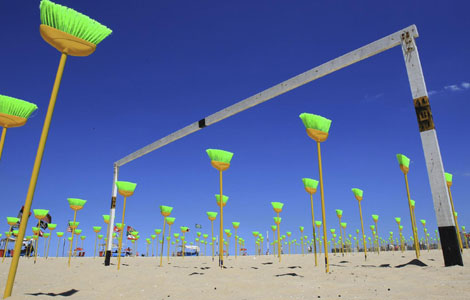ODI makes dramatic rebound amid optimism
Updated: 2011-09-21 08:03
By Ding Qingfen and Wang Xiaotian (China Daily)
|
|||||||||||
33% surge in year to August following sharp drop in July
BEIJING - China's outbound direct investment (ODI) rebounded in August to grow 33 percent from a year earlier, following a sharp decline in July.
The data underscores an increasing interest in overseas activity from the world's fifth-largest investor amid the growing global debt crisis.
Experts at home and abroad are upbeat about the ODI prospects over the next few years, citing the government's "going overseas" policy, the increased capacity of domestic companies and the global economic recession.
According to the Ministry of Commerce, China's non-financial sector ODI gained 33.3 percent year-on-year to $6.57 billion in August. In July the figure fell 58 percent year-on-year to $3.73 billion, signaling the first decline this year.
Between January and August, the nation's non-financial sector ODI gained 6.9 percent to $34.2 billion.
Earlier this month, commerce ministry officials said the July decline was a temporary phenomenon, and that the global debt crisis presents more opportunities than challenges for Chinese companies planning to invest overseas.
"China's outward investment will continue to expand strongly and they (the officials) are correct," said John Ross, a visiting professor at Antai College of Economics and Management at Shanghai Jiao Tong University, who was former director of Economic and Business Policy for Ken Livingstone, the former mayor of London.
In 2010, China overtook Japan and the United Kingdom to become the fifth-largest investor globally. By the end of 2010, the country's total ODI had reached $317.2 billion.
"Direct investment in factories and productive companies in the present situation is much less risky. And in particular, there are important opportunities in developing economies, which are growing rapidly," Ross said.
According to the ministry, during the first eight months of this year, ODI from the Chinese mainland into Hong Kong surged by 42.2 percent, and investment directed toward the ASEAN trading bloc grew by 17.2 percent. However, ODI in developed regions, including the United States and the European Union, showed a decline, but the ministry has yet to release any detailed data.
In September, a consortium including CITIC Group and the steelmakers Anshan Iron and Steel Group Corp, Shougang Corp, Shanghai Baosteel, and Taiyuan Iron & Steel (Group) Co Ltd, announced it would invest $1.95 billion to acquire a 15 percent stake in a Brazilian miner of the metal niobium, which is also known as columbium.
And it's not just about the emerging markets. Wang Shengwen, deputy director-general of the commerce ministry's department of outward investment and economic cooperation, predicted earlier that this year's ODI will register double-digit growth.
"While recovery in the world economy is slow, developed economies are committed to growing their emerging industries and the developing nations are adding investment in infrastructure construction. These offer Chinese companies new and good opportunities for overseas investment," Wang said.
"Chinese investors are also becoming mature enough to make forays into the overseas markets."
The ministry's figures show that between January and August 32.8 percent of Chinese ODI, worth $11.2 billion, was realized through mergers and acquisitions.
"Investment in natural resources and commodities in emerging markets is more favorable for Chinese companies, but in the developed regions, they (Chinese companies) are willing to buy high-tech companies to acquire better technology," said Yan Lan, managing director for China at the global investment bank, Lazard Ltd.
Kenneth Jacobs, Lazard's chairman and chief executive officer, said the economic problems in the US and EU may not necessarily lead to a decline in merger and acquisition activities over the long term.
Xin Zhiming contributed to this story.
Hot Topics
Organ transplant bonds mother and son
Editor's Picks

|

|

|

|

|

|







